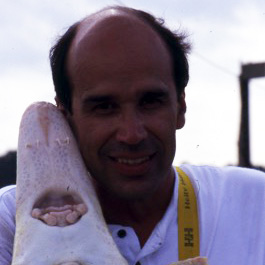 The Whitney Laboratory for Marine Bioscience
The Whitney Laboratory for Marine Bioscience
The Evenings at Whitney Lecture Series hosted by the University of Florida Whitney Laboratory for Marine Bioscience returns on Feb. 14, 2019, at 7 p.m. with the program titled “Saving an Endangered Species: The Life and Lore of the Sturgeon.” Frank Chapman, associate professor of the Program in Fisheries and Aquatic Sciences at the University of Florida, will talk about the unique characteristics of the sturgeon, a species of fish that have been in existence for more than 160 million years.

The Evenings at Whitney Lecture Series hosted by the University of Florida Whitney Laboratory for Marine Bioscience returns on Feb. 14, 2019, at 7 p.m. with the program titled “Saving an Endangered Species: The Life and Lore of the Sturgeon.” Frank Chapman, associate professor of the Program in Fisheries and Aquatic Sciences at the University of Florida, will talk about the unique characteristics of the sturgeon, a species of fish that have been in existence for more than 160 million years. This free lecture will be presented at Lohman Auditorium, located at 9505 Ocean Shore Blvd., on the Whitney Laboratory campus.
Commonly known for being the large fish that jumps and causes damage to boats and injures boaters, the sturgeon has been a focus of Chapman’s research for more than 35 years. Chapman will talk about the lifecycle and lifespan of the fish and how that plus overfishing, habitat changes and pollution are causing most species of the sturgeon to become endangered. Chapman will also share the approaches he has researched and implemented, including farm raising the fish, to help increase the sturgeon’s chance of continued long-term survival.
Chapman is a professor and aquaculture specialist at the University of Florida. His research interests include investigations with an emphasis in reproduction and early development of aquatic animals, specifically ancient and ornamental fishes. He earned a doctorate in ecology and master’s degree in international agricultural development from the University of California, Davis and bachelor’s degree in biological conservation from California State University.